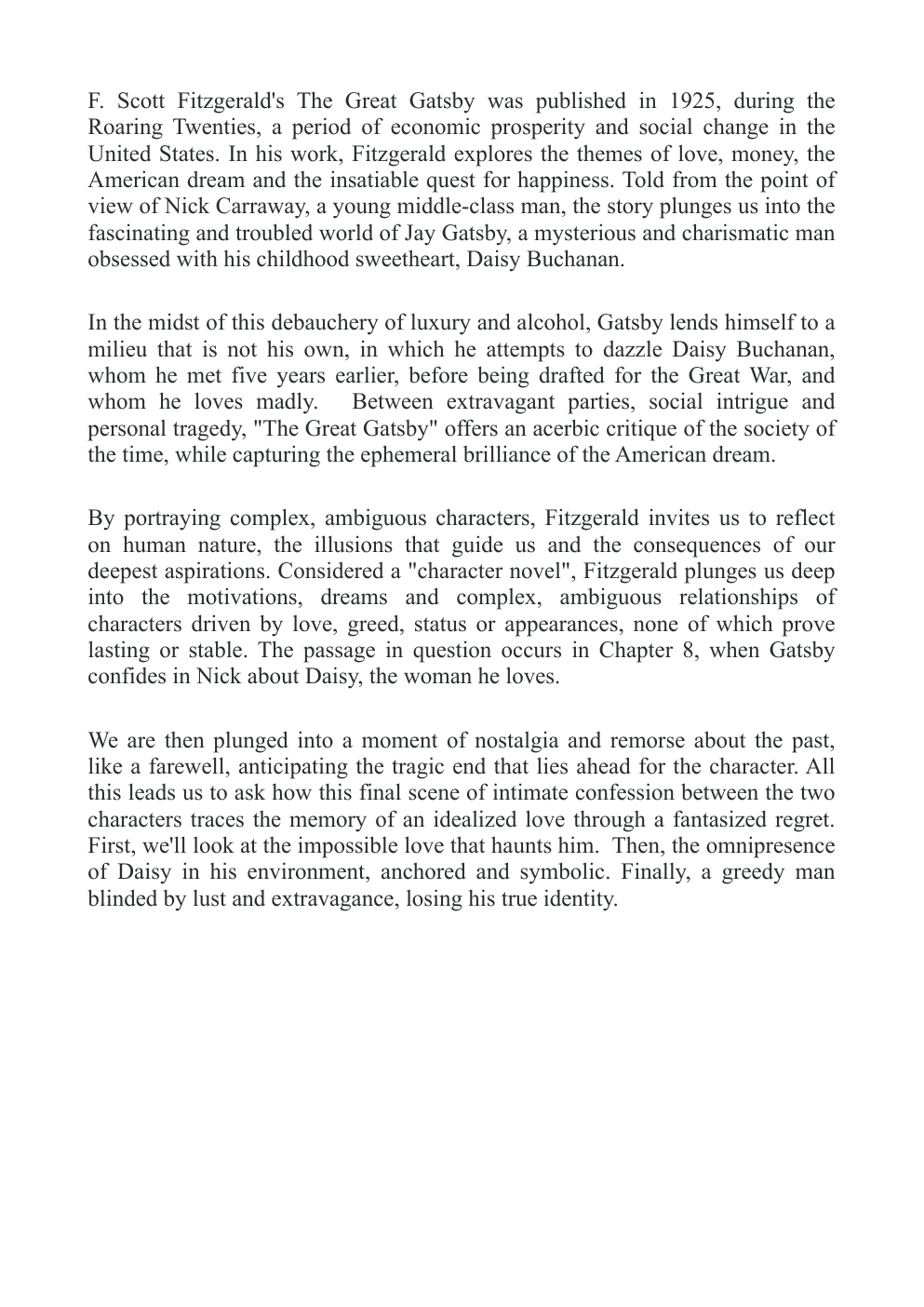kholle: F. Scott Fitzgerald's The Great Gatsby
Publié le 28/04/2024
Extrait du document
«
F.
Scott Fitzgerald's The Great Gatsby was published in 1925, during the
Roaring Twenties, a period of economic prosperity and social change in the
United States.
In his work, Fitzgerald explores the themes of love, money, the
American dream and the insatiable quest for happiness.
Told from the point of
view of Nick Carraway, a young middle-class man, the story plunges us into the
fascinating and troubled world of Jay Gatsby, a mysterious and charismatic man
obsessed with his childhood sweetheart, Daisy Buchanan.
In the midst of this debauchery of luxury and alcohol, Gatsby lends himself to a
milieu that is not his own, in which he attempts to dazzle Daisy Buchanan,
whom he met five years earlier, before being drafted for the Great War, and
whom he loves madly.
Between extravagant parties, social intrigue and
personal tragedy, "The Great Gatsby" offers an acerbic critique of the society of
the time, while capturing the ephemeral brilliance of the American dream.
By portraying complex, ambiguous characters, Fitzgerald invites us to reflect
on human nature, the illusions that guide us and the consequences of our
deepest aspirations.
Considered a "character novel", Fitzgerald plunges us deep
into the motivations, dreams and complex, ambiguous relationships of
characters driven by love, greed, status or appearances, none of which prove
lasting or stable.
The passage in question occurs in Chapter 8, when Gatsby
confides in Nick about Daisy, the woman he loves.
We are then plunged into a moment of nostalgia and remorse about the past,
like a farewell, anticipating the tragic end that lies ahead for the character.
All
this leads us to ask how this final scene of intimate confession between the two
characters traces the memory of an idealized love through a fantasized regret.
First, we'll look at the impossible love that haunts him.
Then, the omnipresence
of Daisy in his environment, anchored and symbolic.
Finally, a greedy man
blinded by lust and extravagance, losing his true identity.
I- In this passage, Gatsby confides in his friend about his past through Daisy.
Indeed, everything brings him back to her.
He begins by talking about his
mysterious life, "the strange story", which would have enabled him to make a
fortune in order to attract the attention of the woman he loves.
Through her story, Tom, Daisy's husband, appears, forming a veritable love
triangle.
Moreover, "The long secret extravagant was played" indicates the
nature of the relationship between Gatsby and Daisy.
We might think of
adultery through this couple's refusal to fully commit to their love.
They hide,
and remain discreet.
Once again, Gatsby remains mysterious and vague about
his life.
« He would have acknowledged anything now » Gatsby will say anything and
cut short any conversation that isn't about the woman he loves.
This creates an
atmosphere of speed, as if he didn't have time to talk about anything else, and
wanted to get to the point: Daisy.
« But he wanted to talk about daisy » This confirms that she's all he thinks
about and that she'll be the subject of all the conversation, emphasizing the
emotions of the memory.
« She was the first « nice » girl ye had never know ».
We're in a story about a
memory.
Daisy was his first and best experience.
Through the understatement
"nice" he expresses his affection.
In reality, he doesn't want to say too much, he
remains mysterious, but we know he's in love with her.
« He had come ….
Indiscernible barbed wire between » None of the
interactions and contacts he had with other women were comparable to Daisy's.
He uses the hyperbole « Indiscernible barbed wire between », which shows how
distant he was, like an impassable boundary between himself and the person in
front of him.
It reinforces his mysterious side and the fact that it's hard to figure
him out and understand him.
He is gradually betrayed by his emotions through the hyperbole « he found her
excitingly desirable »
All this creation of desire and passion around Daisy will drive him to her home,
leaving a trace and a deep memory of these feelings throughout the premises.
II- We're now moving into a focus on environment and atmosphere, through the
use of symbolism, which uses symbols, objects, events or characters to
represent deep-seated ideas or themes.
Here, we find a deep sense of
remembrance, regret, nostalgia and lost love.
« He went to her house….
Then alone » An atmosphere of closeness and
intimacy is established between Gatsby and Daisy through the gradation "with
the officers, then alone".
This also gives us a clue to the nature of their
relationship,
« He had never been in such a beautiful house before » We have his old....
»
↓↓↓ APERÇU DU DOCUMENT ↓↓↓
Liens utiles
- QUELQUES AUTEURS ANGLOSAXONS A connaître US Francis Scott Fitzgerald The Great Gatsby.
- Scott Fitzgerald et Gatsby
- Le personnage de GATSBY Francis Scott Fitzgerald
- Essay The great Gatsby/bluest eye
- Gatsby le Magnifique [Francis Scott Fitzgerald] - Fiche de lecture.


